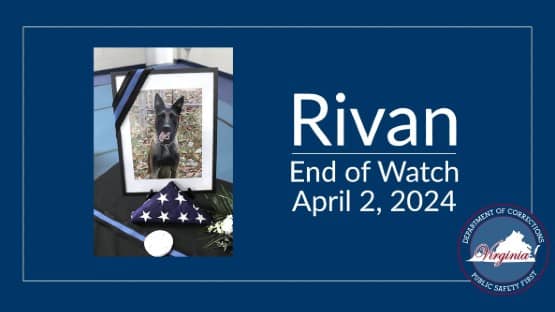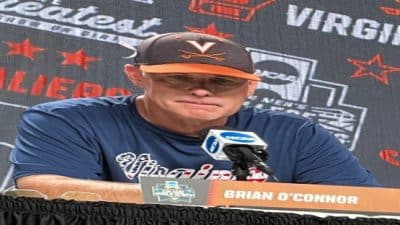Scott German and I did a detailed question-and-answer on what can be done to fix UVA Football on our podcast on Wednesday.
Below are some of the highlights.
The comments have been edited lightly for clarity.
Al Groh’s 2006 recruiting class:
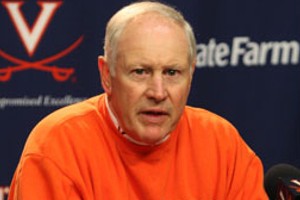
“Al Groh proved this point. Way back, it was 2006, AL Groh had a recruiting class that the major recruiting services ranked in the top 10 nationally. Al Groh is an alum of UVA. He was a graduate assistant coach in his early days at UVA, before going on to the NFL. He was head coach at Wake, went back to NFL, then was the head coach at Virginia for six years before 2006, and then in 2006 he signs a class of 24 that 24 guys that, again, is ranked in the top 10 in the recruiting services. Eight of the guys didn’t qualify. Now, I wrote back then Al Groh didn’t all of a sudden, after 35 years of being a UVA guy, fails to understand that, you know, UVA admissions has standards, and he couldn’t get these eight guys in. He just didn’t forget, he didn’t overlook eight guys’ academic records. He was proving a point. These are the guys I need if you want me to win championships, and you won’t let me get them in school. He proved that point in 2006, and three years later, he was fired because he had three losing seasons out of four years. Mike London then had five losing seasons in six years. Bronco Mendenhall only had two winning seasons. We’ve had basically three winning seasons since Al Groh proved that point.”
How admissions hampers the accumulation of talent:

“There’s just not enough of the accumulated talent at the level that you need them at if UVA football wants to compete with for ACC championships, like every other sport at UVA does. I wrote a story today, Scott, for our listeners out there, viewers out there, the Learfield Directors’ Cup rankings came out today, and Virginia finished fifth in the nation. We were ahead of everybody in the ACC. Carolina, seventh, and then you go on down, and I’ve got the story on there. You know, Tech was somewhere in the 40s. I mean, you know, so we compete in every other sport at the top level, but at football, we hamstring ourselves. You can compete in basketball, for example, men’s basketball is 13 scholarships, you know, and Tony only plays eight guys. You don’t need as many players as you do in football. You need 50 guys, right? So, if our folks aren’t going to let Tony Elliott recruit 50 guys, or whoever the next coach might be, 50 guys, this is why I say, you know, and I’ve been as guilty of this as anybody, being hard on Tony Elliott, I’ve been, ever since I started writing these stories this spring, you know, looking into the academic side of this, this is where people might have noticed, if you hadn’t noticed, now you’ll notice, I’m softening my stance on Tony Elliot and in general, whoever’s the football coach in the future, because, you know, if we fire Tony Elliott, the next guy, unless we change the way we admit football student-athletes into UVA, the next coach is going to have the same set of problems that Tony Elliott has, that Bronco Mendenhall had, that Mike London and Al Groh had.”
How George Welsh did what he did in the ’80s and ‘90s:
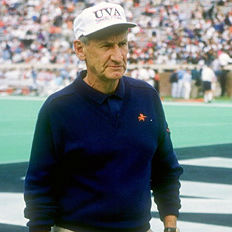
“People ask me, I’ve gotten this question, Scott, and I wonder, I don’t know that I’ve written any columns about this, but I’ve gotten the question, Well, how did George do it? My thought on how George did it was, OK, think back to the ‘80s and ‘90s. We didn’t have 247, we didn’t have Rivals, we didn’t have On3 ranking everybody. We didn’t have the ease of the internet making it so that kids kids and high school coaches could send their videos out to college coaches very easily. They’d have to actually make a tape, put it on VHS, send in the mail, get it there, then the coach would have to watch it. You know, now you can just email clips of guys, right? And so now coaches know so much more about athletes all over the place back in the ‘80s and ‘90s, you know, the Terry Kirbys and the Chris Slades weren’t quite as sought after by the schools outside of our area. I think Kirby was looking at Penn State, and was pretty close to committing to Penn State, and decided at the last minute to go to Virginia. But for the most part, the guys that George got in the ‘80s and ‘90s that he built the UVA program around, a lot of them were Virginia guys, and George did a great job of keeping those guys in-state. We got about 60 percent of Virginia’s best high-school football players, Virginia Tech got about 35 percent of them, and then a couple of guys a year would go somewhere else. But we kept the Virginia guys here. We’re not keeping the Virginia guys here now, because everybody else in the world knows that Virginia is a hotbed for high-school football, and you know, now we’re not getting the top guys.”
The suggested fix:
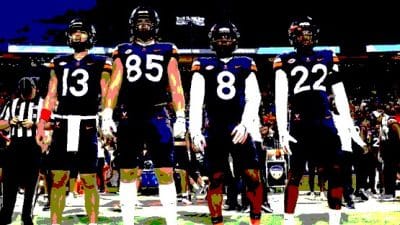
“To me, the solution is for the folks in academics to get a little bit off their high horse because, and I’ve thought this since I was a student at UVA 30-plus years ago. I had roommates who were baseball players, and I had friends who played football and lacrosse, people I knew really well, and it was par for the course back then to think, Oh, well, you know, they’re, you know, they’re jocks. Well, to be successful enough in high school to get a school the caliber of UVA to have you on their radar from a recruiting standpoint, you don’t just start playing your sport, and then it’s just natural. You work your butt off at it, from the time you’re in Little League and then through middle school and in high school, I mean, and it takes work, but also, I mean, you’ve got to be smart at that sport. So why don’t we put the same level of attention to virtuosity in academics, I mean, in athletics that we do, academics, or in art. You know, to be a very successful artist, whether it be visual artist or or a music artist or whatever the case may be, you know, you put so much time and effort in developing those skills. Think of the amount of time that athletes put into developing their skills. And so why don’t we put more emphasis in terms of admissions, and say, Alright, well, you know the standard for UVA, let’s just say, for sake of argument, you know, if you’re an in-state student, if you have 1300 on the SATs and a 3.8 grade point average, that’s getting into UVA. Well, but this, this football players only got 1150, and a 3.5, yeah, but, and not to just reward them for being football players, but also, man, you know, they’ve worked themselves into being one of the top recruits in their class. You know, you might, I would assume that the admissions folks have some leeway for, well, this kid is a, you know, great, great potential drama student here, you know, a great potential playwright or actor or actress, singer, whatever the case may be, but damn, their GPA is only 3.5, and their SATs are only 1250, that’s kind of right on the wrong side of getting into UVA. You know, I would be surprised if we don’t make those decisions, and I think we need to be a little more careful with just turning our nose up to athletic virtuosity in that sense. And maybe it sounds like I’m creating something out of the air there, but I’ve been thinking about this for 30 years. I just, I think, I think that the academics folks need to be a little more cognizant of that virtuosity. And also understand that the kids who get into UVA, who have success at the high-school level in athletics, who’ve created that success for themselves in high-school level at athletics, can apply the dedication it took to get to that high level of athletics to their academics, and also knowing then that at UVA, like a lot of other schools, but UVA, we know well, there are great academic supports in place for student-athletes at UVA. And also just the fact that, you know, these kids, most of these kids, you know, the commercial says it, 99 percent of all athletes aren’t going to play to pro sports, you know, they’re going to go pro in something other than sports. You know, everybody, of course, who goes to a place like UVA thinks, hey, I got a chance of being an NFL player, NBA player, WNBA, MLB, whatever the case may be, but most of them aren’t going to be, but you know, what they can have at the end of four years, they can have a UVA degree, and that will change their lives. So, in that part, Scott, you said this, but isn’t that part of a what a university’s mission is supposed to be?”
“In my own case, now, you know, socioeconomically, I probably come from where a number of, I probably fit socioeconomically more with football players than I do with a lot of the student-athletes in nonrevenue sports at UVA. I don’t want to cast any aspersions, but if you’re a swimmer or a field hockey player, or, you know, name, a bunch of sports like tennis and stuff like that, those are high cost of entry sports. Even when you’re a youth, you know, a lot of training, a lot of, you know, tennis lessons or swimming lessons and that kind of thing, you know, so those tend to be a little more socioeconomically upper middle-class kind of sports. Football tends to be the more working-class sport. I came from a very working-class background. I grew up, man, my parents were teen parents, I grew up in a trailer park, my parents split when I was young. I grew up poor, you know, free and reduced lunch in school and all that stuff. Now I had to get into UVA because of academics, and I did, fortunately for me, but man, that changed my life, and as a result, I’m hopefully having a positive impact on a lot of other people’s lives through what I do with Augusta Free Press. And so, if we say for football players who, again, I think tend to, I mean, I’m not, you know, I don’t have numbers in front of me, but I can guarantee you that socioeconomically, the players are going to skew more towards working-class and lower middle-class backgrounds, you give those kids an opportunity to earn a UVA degree, and whether they make the NFL or not, they are going to change the world because of that UVA degree. And so you’re not just giving a kid a chance to play football at UVA, you’re giving them a chance to play football and then a chance to change their lives and their kids’ lives and their grandkids’ lives.”
What is it at UVA that holds this back?
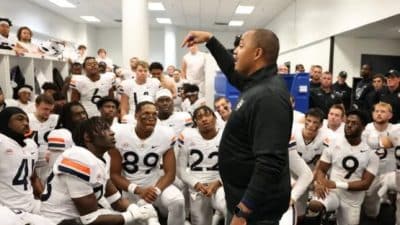
“I’ve identified this and written about this more recently, but also in years past, I think there’s just this weird, like, dichotomy at UVA. You know, we want to be great in athletics because we want to be UVA people, I mean, you know, we want to be great at everything, if we’re going to do something, we’re going to be the best at it. That’s the UVA attitude. That’s what I love. That’s what drew me to want to go to school at UVA when I was a kid, even growing up on a trailer park, I wanted to go somewhere where everybody wanted to be the best. But also, though, at UVA, we don’t want to be the best at football. Colgate Darden is the example I want to come up with here. Colgate Darden was the president of UVA in the 1950s. We had ourselves a good coach at the time, his name is escaping me right this second, but had a run of really good seasons, and then in 1951 season, that team finished 8-1 and was number 13 in the final national polls, and got invited to the Orange Bowl. So, we played the Orange Bowl in 2019, but that’s not the first time we got the invite. We got the invite in 1952, and Colgate Darden refused the bid on behalf of UVA athletics, because basically there was a quote, the sum of the quote is, effectively, we don’t want to be part of the big-time football machine. And so, the coach that we had, who was successful, had led us to a, you know, run of four or five really good seasons, he quit. If we’re not going to try, I’m leaving. And we didn’t play our first bowl game. Scott, so we were invited to 1952 Orange Bowl, we didn’t play our first bowl game until George Welsh took us to the Peach Bowl in 1984. That’s the wages of the sin of UVA football being too good. In 1952, we sentenced ourselves to 30 years of mediocrity. And even then, you know, we hired George Welsh, he has his run, and there’s the quote from John Casteen, the former president of UVA, who referred to sports as being a jocular pursuit. This was like in 2007 or 2008. This is not that long ago. So, there is this undercurrent within the UVA community of, OK, we want to be the best at everything, and if it means athletics, we want to be the best at athletics. But I don’t know about that football thing. I don’t know if we want to be the best at that, too.”
Sunk money:
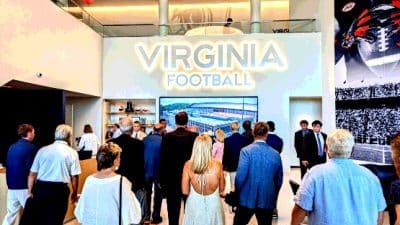
“You know, it’s been over 20 years, I think it was 1998, 1999, that UVA did its last significant upgrade to Scott Stadium that cost about $100 million in those dollars, when you, you know inflation value, that’s a couple hundred million dollars. And then, you know, the $80 million for the football ops center. I mean, that money is sunk money. We’ve already spent the money, you know. I don’t you could tear the stadium down, you know, put houses in there. The football ops center, you could turn into a general student center of some sort, you know, you get some value out of that. But I mean, all the money that’s gone into football over the years, you’re not going to just shut the football program down. So, if you’re not going to just shut it down, your other options are, continue winning three games a year, and it’s hard to imagine, no matter who the coach is, that given the current realities in terms of the admission standards that you we’re going to get any coach who can – Nick Saban, if you don’t give him the ability to get more than 10 or 12 players in a year who can compete with his former Alabama teams, who had 50 players that could compete with Alabama teams, Nick Saban is not going to win 10 games, nine games, eight games at UVA. So, if you’re going to look at the money we’ve invested in all the facilities, you want to look at the time and effort we’ve spent, figure out a way to make some money off of that money. And it can help everybody. If we are better at football, we can be even better at women’s swimming, which has won four straight national titles, it has half the US women’s swimming team from the from the trials this week. It seems like we can be even better at men’s tennis. We can be even better at men’s lacrosse. We can give Brian O’Connor even more to work with and take teams to Omaha. If we are better at football, it can help everybody be better. I’m the guy, Scott, who used to always say that degree hanging on my wall above my head here is too valuable to me to water down by letting guys or gals in that don’t meet the standards. You know what? I’m also the UVA guy who says, What drew me to UVA was that we want to be the best at everything. I want to be the best at football, just like I want UVA to be the best at men’s basketball, women’s basketball. I want to go to Omaha every year, you know? I want to see our Olympic swimmers do well in Paris this year and in future years. So, so if we’re going to play football, Scott, play football. If you’re not, don’t, don’t even try.”
Bottom line:
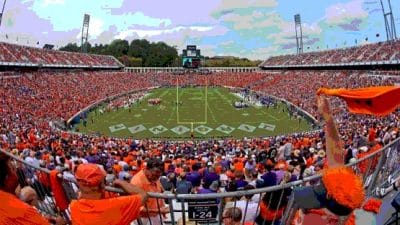
“We’re not saying, just let anybody in. We’re saying, take into account the hard work that it takes to be a good athlete. And still, I mean, there’s still things like, you know, we want character kids. We want kids who are we’re going to value that opportunity to come to UVA and make a difference in the world through their education. We want kids who are going to work hard when they get there, and get, you know, get a degree in four years or five years, as the case may be. I mean, you know, we don’t want to be, you know, I don’t want to, I don’t want to get into any trouble here at the end of the podcast and mention any schools by name, but we don’t want to become a school where the kids all end up on the arrest logs and give us a bad name. We don’t want that kind of thing. But, man, there’s plenty of kids out there that we can get, that we’re not getting now, that Michigan’s getting now, that Penn State’s getting now, that Clemson’s getting now, out of our own backyard, out of Richmond, out of 757, out of Northern Virginia, that we’re losing out on because the admissions folks are just a little snooty. I mean, just what it is, it’s just all it is.”



